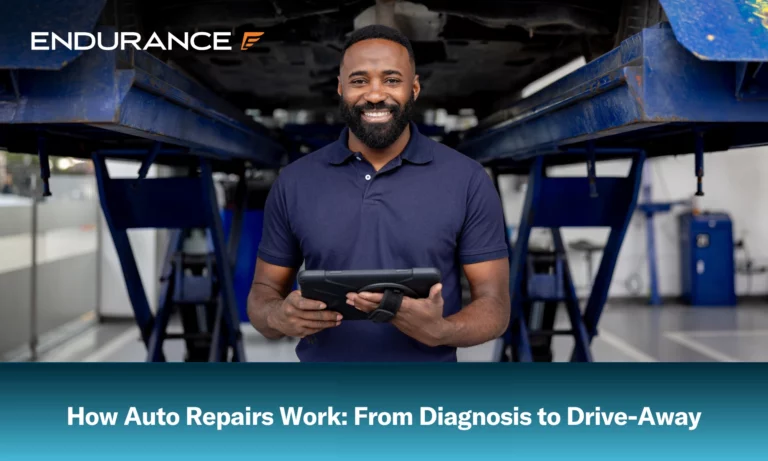What Causes Your Vehicle’s A/C to Break Down?

A vehicle’s A/C system is designed to keep the driver and passengers comfortable inside a car’s cabin. If an issue arises, you might be left feeling the heat – both physically and financially, especially if you don’t have a vehicle service contract to help protect you from unexpected costs. However, as with any critical system within a vehicle, there are several potential causes for why your car’s A/C may stop working correctly.
To learn about these common causes and how you can identify them, it’s important first to understand how your vehicle’s A/C system operates.
How Your Car’s A/C Works
Your vehicle’s air conditioning is a complex and integral system that requires a number of components to work in sync. Understanding the basics of this system is the best place to start when learning the warning signs of common A/C problems.
The main tools in your car’s air conditioning system are refrigerants. Not to be confused with coolants, which keep your engine from overheating, refrigerants are directly responsible for the cool air blowing from your vents. Refrigerants, such as Freon, are gases that are converted into a liquid and then back into a gas during the complete air conditioning cycle. This process is directly responsible for the cool air blown into the cabin when your air conditioning runs.
But how does this process work?
It starts with a component known as the A/C compressor. This part draws in the low-pressure and low-temperature refrigerant gas and compresses it into a high-pressure, high-temperature gas.
After traveling through the compressor, the gas is sent to the A/C condenser, which you can usually find in front of your car’s radiator. The condenser will then capture the heat from the gas before removing it out of the A/C system. The now cool refrigerant passes through the condenser, turning it into a low temperature, high-pressure liquid.
Next, the liquid goes through a component called an accumulator to remove any excess moisture and to prevent freezing. From here, the liquid is turned back into a gas before ultimately making its way into your vehicle’s air conditioning vents, resulting in the cool air you’ve come to rely on in the summertime months.
Ways to Detect if the A/C System is Broken
With something as critical as air conditioning, it’s essential to pinpoint the warning signs of any potential problems as soon as possible. Thankfully, there are several ways to determine an issue with your car’s air conditioning system. While an A/C not blowing cold air or any air at all are two of the most common signs of issues, there are many more to be aware of.
A few common examples are:
- Airflow being interrupted or weaker than normal
- Hearing loud noises when the A/C is activated
- Water leaking into the cabin only when the A/C is active
- Air temperature fluctuating on its own
- A burning or foul smell coming from the A/C vents
- Nothing happening when the A/C is activated
- Higher levels of humidity in the cabin when the A/C is activated
Should you notice any of the above signs, it’s best to take your vehicle to a licensed auto repair shop or certified mechanic. If you need an A/C repair, a vehicle service contract from Endurance could help cover the cost of those repair bills.
Common Causes of a Faulty A/C System
With something as complex as your car’s air conditioning, problems may occur in any area of the overall system. Below are just a few common causes of a faulty air conditioning system:
Faulty A/C Compressor
As mentioned, the A/C compressor is responsible for beginning the A/C process by converting low pressure, low-temperature refrigerant gas into a high pressure, high-temperature gas.
Most compressors use a sealed bearing to turn and other internal parts that can break or become damaged. If this happens, the compressor may fail to work correctly or even completely. This problem will likely manifest as loud, grinding noises when the A/C is activated.
Additionally, if nothing happens when you turn on the A/C, the compressor may not be moving. Should this occur, the entire system will fail to operate and no air will come out of the vents.
Lack of Refrigerant
Low refrigerant levels can be directly responsible if you find your car’s A/C not cold. When you don’t have enough refrigerant or the rubber seals are worn down and leaking, it will be impossible to get cold air through your air conditioning unit.
If you notice your vents not blowing cold air, air not quite reaching the set temperature, or poor airflow in general, you may be low on refrigerant. For older vehicles or vehicles with a significant leak, the refrigerant may need to be entirely replaced. However, if properly maintained, you should only need to replace or recharge your refrigerant once every few years. For more information about your vehicle’s proper maintenance schedule, check your vehicle’s user manual.
Old Air Filter
Like with a home air conditioning unit, improper care of your car’s HVAC system can cause A/C troubles. One such component you should maintain is your cabin air filter. This component helps to remove potentially harmful pollutants that come into the car by constantly filtering the air as it passes through the A/C system. An old cabin air filter can cause a foul odor in your vehicle from a buildup of contaminants. If you are looking to check if your filter is old, you can typically find it located behind your car’s glovebox.
Evaporator Issues
The evaporator is responsible for helping cool the refrigerant and removing excess moisture. Therefore, if something goes wrong with the evaporator, the air you feel coming out of your vents may not be cool.
It is also possible that if your A/C begins to work correctly but then starts to fail, you may have a clog in your expansion valve. This component helps regulate the correct amounts of refrigerant sent to the evaporator. You may notice water leaking around the vents in these cases, which a clogged drain hose could cause in the evaporator. It’s also possible that the liquid seeping out of the vents is liquid refrigerant itself, which is colorless.
Electrical Issues
As with most complex systems, electrical issues are a common finding when diagnosing A/C problems. For example, if you smell a burning odor coming from the vents, it’s possible that the wiring has suffered some damage. When wiring is damaged in the air conditioning system, the compressor, condenser, evaporator, and other system components can all experience problems.
Regardless of the specific cause of your A/C issues, it’s always best to trust licensed professionals to service your vehicle. If an Endurance vehicle protection plan covers you, it’s also possible that your coverage will extend to cover other common car problems, such as engine or transmission issues.
A Vehicle Protection Plan Can Help
You’ve purchased a vehicle with many great features, such as A/C for a hot day, so it’s important to make sure you’re riding in comfort and protected from unexpected repairs. Endurance offers several vehicle protection plan packages ranging from basic to the most comprehensive plans on the market, like EnduranceAdvantageTM, to keep your vehicle and its components running.
Additionally, every Endurance package comes with a free year of Endurance Elite Benefits that feature perks such as 24/7 roadside assistance, key fob replacement, and more.
If you have any questions about your existing coverage or if you’re interested in any of the coverage options available, reach out to Endurance today for a free, no-obligation quote or give us a call at (800) 253-8203.













Larry Witherspoon Jr. is a co-founder and Executive Director of the Automotive Training Center. Larry has held multiple leadership positions in the U. S. Navy and with various Fortune 100 companies. In addition to his business experience, Larry grew up understanding the difficulties all young men face becoming adults especially those that come from challenging circumstances. He has taken those experiences growing up and combined them with his passion for vehicles to start the Automotive Training Center. Read more about Larry.